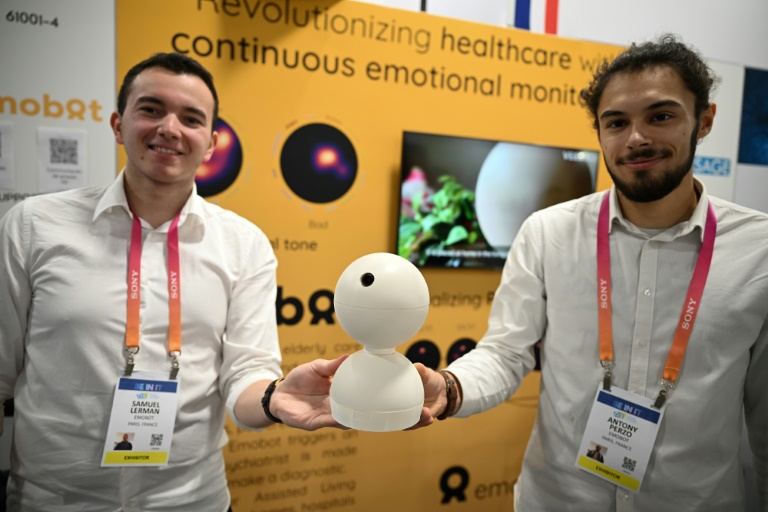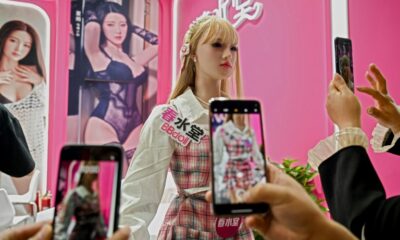Entrepreneur Antony Perzo introduces a small device called Emobot, which looks like a cross between a speaker and a piece of abstract art, and explains: “It’s an emotional thermometer!”
Like hundreds of other exhibitors at CES, the world’s biggest tech expo, French engineer Perzo is selling the merits of an object that depends on the latest breakthroughs in artificial intelligence.
AI is the big buzzword at the Las Vegas tech extravaganza, with companies big and small unveiling anything from TVs to toothbrushes that depend on big data and connected computing to impress.
Perzo’s Emobot, shown in a corner of Sin City’s Venetian hotel, is used to detect possible psychiatric disorders in the elderly and could help caregivers in nursing homes adjust treatment without waiting for the next visit from the psychiatrist.
The technology can “analyze micro facial expressions” that reflect human emotions, themselves a magnifier of our “psychological and psychiatric state”, said the engineer.
In Last Vegas, AI-powered gadgets cram the hallways — there are AI bird feeders, baby carriages or fatigue-fighting wristwatches -– to the point that some wonder if the phenomenon is being oversold and used as a marketing tactic rather than to show an actual breakthrough.
But AI “isn’t just a buzzword to win its CES bingo,” noted tech analyst Avi Greengart.
The technology “is used in smartphone cameras, in factories to spot defective products, in agriculture to identify weeds and spray them with weed killer. AI is here to stay,” he said.
Using AI to explore emotions is also the ambition of Emil Jimenez, who founded MindBank Ai in a “quest for immortality…so my daughter could always ask her daddy a question.”
His app ask users to record their answers to deeply personal questions (“What does love mean to you?”) in order to “save your mind forever on the cloud.”
But the service has won over some users on the promise of knowing yourself better while you’re alive. Today it can analyze voice recordings and one day hopes his app will analyze just your tone of voice to decipher moods.
– ‘Huge opportunity’ –
AI can also be used to understand crowds. Canadian company Advanced Symbolics has developed Ask Polly, which trawls through social media to conduct market research in just minutes.
The user asks it a question — for example, “Is this a good time to buy an apartment?” or “Should underage criminals go to jail?” — and the program scans social networks like Twitter, TikTok, Reddit and Instagram to survey public opinion on a large scale.
The biggest AI headlines lately have been on algorithms that make it possible to create original content at the click of a mouse.
The California-based company OpenAI has impressed with ChatGPT, a simple to use software that generates a poem or school essay in seconds, and DALL- E which creates visual art.
Following in their wake, French start-up Imki has designed a sound and light show for the ancient Roman theater in southern France using similar programs.
“This allows us to create content quickly with very low production costs”, said Marie Lathoud, marketing director of Imki.
While she sees AI as a tool for artists, Saket Dandotia, director of operations at Magnifi, recognizes that so-called generative AI represents a threat to the designers it will replace, much like robots in factories.
AI tools like ChatGBT are “faster, less costly,” Dandotia said.
His team created Strobe, an automated video software. “For us, AI is a huge opportunity, which will transform the entire creative design industry,” he said

 Business4 months ago
Business4 months ago
 Business5 months ago
Business5 months ago
 Events3 months ago
Events3 months ago
 People4 months ago
People4 months ago
 Events6 months ago
Events6 months ago
















